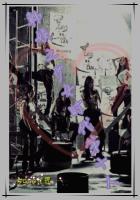What has been here sketched is not planned so much as a criticism in form on Herrick's poetry as an attempt to seize his relations to his predecessors and contemporaries. If we now tentatively inquire what place may be assigned to him in our literature at large, Herrick has no single lyric to show equal, in pomp of music, brilliancy of diction, or elevation of sentiment to some which Spenser before, Milton in his own time, Dryden and Gray, Wordsworth and Shelley, since have given us. Nor has he, as already noticed, the peculiar finish and reserve (if the phrase may be allowed) traceable, though rarely, in Ben Jonson and others of the seventeenth century. He does not want passion; yet his passion wants concentration: it is too ready, also, to dwell on externals: imagination with him generally appears clothed in forms of fancy. Among his contemporaries, take Crashaw's 'Wishes': Sir J. Beaumont's elegy on his child Gervase: take Bishop King's 'Surrender':
My once-dear Love!--hapless, that I no more Must call thee so. . . . The rich affection's store That fed our hopes, lies now exhaust and spent, Like sums of treasure unto bankrupts lent:--
We that did nothing study but the way To love each other, with which thoughts the day Rose with delight to us, and with them set, Must learn the hateful art, how to forget!
--Fold back our arms, take home our fruitless loves, That must new fortunes try, like turtle doves Dislodged from their haunts. We must in tears Unwind a love knit up in many years.
In this one kiss I here surrender thee Back to thyself: so thou again art free:- take eight lines by some old unknown Northern singer:
When I think on the happy days I spent wi' you, my dearie, And now what lands between us lie, How can I be but eerie!
How slow ye move, ye heavy hours, As ye were wae and weary!
It was na sae ye glinted by When I was wi' my dearie:--















